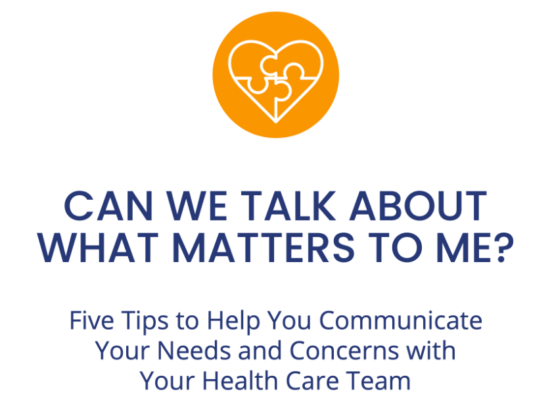Palliative Care

After traveling to different communities to connect with patients and caregivers, Melissa Williams shares her insights about what really matters to them.
Over the past year, National Patient Advocate Foundation (NPAF) piloted “Can We Talk?” community outreach events in Denver, Richmond, Raleigh and Seattle. Our goal was to connect patients, caregivers and health care professionals through interactive conversations about what matters most to them in the setting of serious illness and learn skills that help them comfortably share this information to get the care they want. This initiative also introduced diverse audiences to Patient Advocate Foundation (PAF) services and resources and NPAF’s person-centered policy platform, showcasing how they can get involved.
The meetings helped participants understand the value of person-centered care and the benefits of articulating personal preferences and priorities as part of shared decision making and treatment planning with health care teams. An innovative conversation game called “Hello” was a key tool featured as part of the advocacy skill building exercises. Hello helps break down the barriers of difficult topics by fostering a fun, safe and collegial environment for describing quality of life priorities as vital parts of improving the lived experience throughout the course of illness.
“Can We Talk?” also included opportunities for participants to share powerful stories about how they overcame communication challenges so that clinical care would include consideration of their personal perspectives. Michael from Richmond described how he was upfront with his doctor about how he wanted to receive information. As an imaging physicist, it was helpful for him to hear the science behind recommended treatments for multiple sclerosis so that he could decide on the best therapies for him. Julie from Raleigh shared the frustration she felt trying to find someone who could accurately diagnose and effectively treat her teenage daughter’s symptoms. Doctors often were dismissive of Julie’s concerns, saying her daughter was too young to have arthritis; yet, like Julie, she was eventually diagnosed with psoriatic arthritis when they finally found a doctor who would listen to them.
In Seattle, Priscilla described the impact of shifting to part-time work in order to take on a caregiving role for her mom. She was particularly grateful for the empathic communication skills exhibited by Dr. Randy Curtis during her mother’s care because he listened to Priscilla’s concerns and also focused on her well-being. Dr. Curtis is director of the UW Cambia Palliative Care Cambia Center of Excellence (the Center), and Priscilla now serves as co-chair of the Center’s Community Advisory Board. In their engaging dialogue at the Seattle meeting, Priscilla detailed how Dr. Curtis asked about and listened thoughtfully to her needs and worries as a caregiver, particularly concentrating on optimizing quality of life for Priscilla and her mother. Consistent with palliative care principles, he treated both patient and caregiver as a unit of care needing supportive services, and he consistently invited them to ask questions and relay their concerns as part of every clinical encounter. Without this kind of palliative care as an extra layer of support, Priscilla said she wouldn’t have had the help she desperately needed or the wherewithal to coordinate her mom’s complex care.
Participants said stories like these were validating and comforting to hear and sharing them prompted meaningful conversations around the room about the lengths people must go to get the person-centered care they need. Participants also talked about how their shared experiences motivated them to become patient advocates, like Robin Shapiro who attended our Seattle meeting. She co-founded the Washington State Health Advocacy Association and even wrote a book, The Secret Language of Healthcare, based on the life-changing experiences of others as they navigated or helped others navigate health care decision-making.
Many participants said they didn’t know where to begin or how to handle the physical, financial and psychosocial tolls of coping with complex or chronic conditions. This is partly because the health system conditions everyone to think only about their medical condition, often overlooking the broader constellation of concerns affecting peoples’ quality of life and well-being. To equip patients, caregivers and health professionals with the skills, resources and confidence to communicate comfortably about what matters in treating the person beyond the disease, NPAF produced “Can We Talk About What Matters to Me?” a print on demand patient- and caregiver-facing resource to guide them.
The candid conversations between patients, caregivers and health professionals at each of these meetings were exactly what we wanted to achieve through “Can We Talk?”. In fact, the 90+ participants in these varied communities collectively reported that after participating in our meeting, they felt more confident to talk about the things that matter most with their doctors and loved ones (63% strongly agreed/37% agreed). They also said that “Can We Talk?” helped them understand how to use their own stories and experience to advocate for themselves and on behalf of all patients (60% strongly agreed/40% agreed). These strong results suggest a ripe opportunity to scale “Can We Talk?” content so it can reach broader audiences nationwide.
Scaling these person-centered strategies will require strategic system level change grounded in public policy reforms. Building on the “Can We Talk?” feedback and the momentum of our growing grassroots base, NPAF has introduced new policy principles that address unmet financial and social needs —a universal problem we heard in our different “Can We Talk?” meetings and have also heard consistently as a challenge reported by thousands of people served by PAF annually as well. Looking ahead, these principles will serve as the foundation for developing federal legislative proposals that ultimately will elevate financial and social needs navigation services as part of the expected standard of care. We are excited about the next steps and look forward to involving our grassroots advocates and partners in building public demand that truly brings person-centered care everywhere.